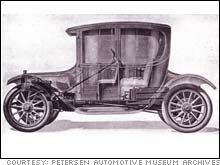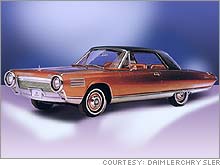|
Hybrid cars are so last century
Alternative fuels go way, way back. Museum exhibit includes coal-burning cars, jet cars, solar vehicles and early hybrids.
NEW YORK (CNNMoney.com) - Today's fuel efficiency trivia question: When was the first gas-electric hybrid car produced? If you guessed something like 1983, you're wrong. Try much earlier.
On display at an exhibit opening Saturday at the Petersen Automotive Museum in Los Angeles will be a 1917 Woods Dual Power, which had a gasoline engine coupled with an electric motor-generator, just like modern hybrid cars. Unlike the Toyota Prius, however, the Woods Dual Power was a marketing flop. Production ceased after just two years. The name of the exhibit is "Alternative Power: Propulsion after Petroleum." It covers the history of automotive power from 1866 to the present, including steam, electric, hydrogen, solar and jet-powered vehicles. It even includes one 1938 car that was modified to run on coal gas. "Experimentation and discovery of new technologies is what really drives the auto industry and a walk through this exhibit is an entertaining trip from the past into our future beyond petroleum," said Dick Messer, director of the museum, in a statement. In the earliest days of automobiles, all forms of power were equally "alternative." Steam power was the favored choice of driving enthusiasts in the late 1800s and early 1900s, according to the book "Wheels for the World" by Douglas Brinkley, a history of the Ford Motor Company. Steam-powered cars were the fastest machines on the roads, such as they were, in those days. Electric cars, clean and quiet but slow, were popular with the more practical-minded. They were seen as women's cars, appropriate for running errands around town. Gasoline-powered cars were least popular of the three types at the turn of the last century. They were dirty, noisy and full of shakes and rattles. (The point of the early hybrid cars -- experts cite examples as early as 1903 -- was to combine the electric car's smoothness and ease of starting with the longer range and higher speed of gasoline-powered cars.) Even after gasoline engines had improved enough to gain wide acceptance, engineers kept up experiments with other types of power. The 1938 Citroen 11 in the Petersen exhibit was fitted with a coal gas generator so that it could be driven despite World War II gasoline shortages in Europe. The fender-mounted generator produced a combustible gas by partially burning wood or coal. The exhibit also includes General Motors' single-seat 1954 XP-21 Firebird, an experimental turbine-powered car that looks very much like a jet fighter plane. Turbine cars used small jet engines to spin turbines that, in turn, powered the cars' wheels. One of the great promises of turbine power was that jet engines could run on a variety of different fuels including gasoline, diesel and kerosene. In 1963, Chrysler, the company that took turbine power most seriously, built about 50 copper-colored turbine cars which they lent out to selected families for real-world use. One of those cars is in the Petersen exhibit. "Chrysler, in the years right after World War II, was very serious about trying to make the gas turbine practical and economically viable," said Bob Casey, transportation curator for the Henry Ford Museum and Greenfield Village. At the time, Chrysler's plan was to produce 500 turbine-powered 1966 Dodge Chargers that would be sold to the public, said Todd Lassa who wrote about the turbine cars for the current issue of Motor Trend Classic magazine. Those cars never appeared. Ultimately, decades of turbine car experimentation led nowhere. They got no better fuel mileage than traditional gasoline engines and they had trouble meeting new emissions requirements, Lassa said. Car companies have, most recently, turned to hydrogen as a promising "fuel of the future." In a move reminiscent of Chrysler giving turbine cars to American families, Honda has put its hydrogen fuel cell-powered FCX, one of which is in the exhibit, in the hands of real customers. Other companies have fuel cell-powered trucks in fleet use. The fate of hydrogen fuel cells remains to be seen as more attention is given to the problem of extracting the hydrogen from sources such as hydrocarbon fuels. "Engineering is not an easy business because for every advantage you have to look at disadvantages with the technology," said Lassa. Related: Saturn Vue Green Line: hybrid for tightwads |
|


